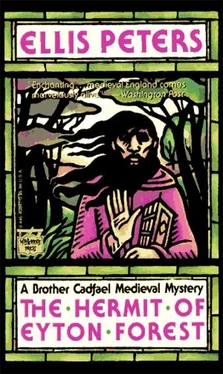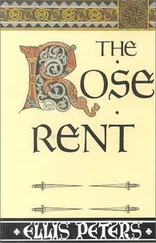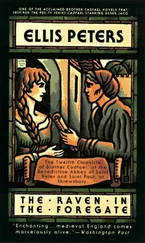“He is gone,” said Cadfael. “I would not slough off the burden of choice on to you, though I think I know what you would have done. But I have done it for you. He is gone, and I let him go.”
They were sitting together, as so often they had sat at the last ebb of a crisis, weary but eased, on the seat against the north wall of the herbarium, where the warmth of noonday lingered and the light wind was shut out. In another week or two it would be too cold and bleak for comfort here. This prolonged mild autumn could not last much longer, the weather-wise were beginning to sniff the air and foretell the first hard frost, and plentiful snow to come in December. “I have not forgotten,” said Hugh, “that this is the tomorrow when you promised me a fitting ending. So he is gone! And you let him go! Another he, not Bosiet. You were aching for him to tire of his vengeance and depart, more likely to urge him away than try to prevent. Say on, I’m listening.” He was always a good listener, not given to exclamation or needless questions, he could sit gazing meditatively across the dishevelled garden in receptive silence, and never trouble his companion with a glance, and never miss a word, nor need many of them for understanding.
“I am in need of the confessional, if you will be my priest,” said Cadfael.
“And keep your confidences as tightly sealed—I know! My answer is yes. I never yet found you in need of absolution from me. Who is this he who is gone?”
“His name,” said Cadfael, “is Rafe de Genville, though here he called himself Rafe of Coventry, a falconer to the earl of Warwick.”
“The quiet elder with the chestnut horse? I never saw him but the once, I think,” said Hugh. “He was one guest here who had nothing to ask of me, and I was grateful for it, having my hands full of Bosiets. And what had Rafe of Coventry done, that either you or I should hesitate to let him go?”
“He had killed Cuthred. In fair fight. He laid his sword by, because Cuthred had none. Dagger against dagger he fought and killed him.” Hugh had said no word, only turned his head towards his friend for a moment, studied with penetrating attention the set of Cadfael’s face, and waited. “For good reason,” said Cadfael. “You’ll not have forgotten the tale we heard of the empress’s messenger sent out of Oxford, just as King Stephen shut his iron ring round the castle. Sent forth with money and jewels and a letter for Brian FitzCount, cut off from her in Wallingford. And how they found his horse straying in the woods along the road, with blood-stained harness and empty saddlebags. The body they never found. The Thames runs close. There’s room in the woods for a grave. So the lord of Wallingford was robbed of the empress’s treasure. He has beggared himself for her long ago, ungrudging, and his garrison must eat. And the letter meant for him was stolen along with all the rest. And Rafe de Genville is vassal and devoted friend to Brian FitzCount, and loyal liegeman to the empress, and was not minded to let that crime go unavenged.
“What traces he found along the way to bring him into these parts I never asked, and he never told me, but bring him they did. The day he came I met with him in the stables, and by chance it came out that we had Drogo Bosiet lying dead in the mortuary chapel. I recall that I had not mentioned the name, but perhaps if I had he would still have done what he did, since names can be changed. He went straightway to look at this dead man, but at a glance he lost all interest in him. He was looking for someone, a guest here, a stranger, a traveller, but it was not Bosiet. In a young fellow of twenty, like Hyacinth, he had no interest at all. It was a man of his own years and estate he was seeking. Dame Dionisia’s holy man he must surely have heard about, but dismissed him as priest and pilgrim, vouched for and above suspicion. Until he heard, as we all did, young Richard bellow that the hermit was no priest but a cheat. I looked for Rafe afterwards, and he and his horse were gone. It was an impostor and cheat he was looking for. And he found him, Hugh, that night at the hermitage. Found him, fought him, killed him. And took back all that he had stolen, jewels and coin from the casket on the altar, and the breviary that belonged to the empress, and was used to carry letters between her and FitzCount when they were apart. You’ll recall that Cuthred’s dagger was bloodied. I have dressed Rafe de Genville’s wound, I have received his confidence as I have now delivered you mine, and I have wished him godspeed back to Wallingford.”
Cadfael sat back with a deep and grateful sigh, and leaned his head against the rough stones of the wall, and there was a long but tranquil silence between them. Hugh stirred at last, and asked: “How did you come to know what he was about? There must have been more than that first encounter, to draw you into his secrets. He said little, he hunted alone. What more happened, to bring you so close to him?”
“I was with him when he dropped some coins into our alms box. One of them fell to the flags, and I picked it up. A silver penny of the empress, minted recently in Oxford. He made no secret of it. Did I not wonder, he said, what the empress’s liegeman was doing so far from the battle? And I drew a bow at a very long venture, and said he might well be looking for the murderer who robbed and slew Renaud Bourchier on the road to Wallingford.”
“And he owned it?” said Hugh.
“No. He said no, it was not so. It was a good thought, he said, almost he wished it had been true, but it was not so. And he told truth. Every word he ever said to me was truth, and I knew it. No, Cuthred was not a murderer, not then, never until Drogo Bosiet walked into his cell to enquire after a runaway villein, and came face to face with a man he had seen, talked with, played chess with, at Thame some weeks before, in a very different guise. A man who bore arms and showed knightly, but went the roads on foot, for there was no horse belonging to him in the stable at Thame, none that came with him, none that departed with him. And this was early in October. All this Aymer told us, after his father had been silenced.”
“I begin,” said Hugh slowly, “to read your riddle.” He narrowed his eyes upon distance, through the half-naked branches of the trees that showed above the southern wall of the garden. “When did you ever question so far astray without a purpose? I should have known when you asked about the horse. A rider without a horse at Thame and a horse without a rider wandering the woods by the Wallingford road make sense when put together. No!” he said in shocked and outraged protest, staring aghast at the image he had raised. “Where have you brought me? Is this truth, or have I shot wild? Bourchier himself?” The first tremor of the evening chill shook the harvested and sleepy herbs with a colder wind, and Hugh shook with them in a convulsion of incredulous distaste. “What could be worth so monstrous a treason? This was fouler than murder.”
“So thought Rafe de Genville. And he has taken vengeance for it in measure accordingly. And he is gone, and I wished him godspeed in his going.”
“So would I have done. So I do!” said Hugh, and stared across the garden with lips curled in fastidious disdain, contemplating the enormity of the chosen and deliberate dishonour. “There is nothing, there can be nothing, worth purchasing at such a price.”
“Renaud Bourchier thought otherwise, having other values. He gained his life and liberty first,” said Cadfael, checking off the score on his fingers, and shaking his head over every item. “By sending him out of Oxford before the ring of steel shut fast, she released him to make off into safer pastures. Not that I believe he had even the excuse of being a simple coward. Quite coldly, I fancy, he preferred to remove himself from the risk of death or capture, which have come closer to her armies there in Oxford than ever they came before. Coldly and practically he severed all his ties of fealty, and retired into obscurity to look round for the next opportunity. Second, with the theft of the treasure she entrusted to him he had ample means to live, wherever he might go. And third, and worst of all, he had a powerful weapon, one which could be used to secure him new soldier service, and lands, and favour, a new and profitable career to replace the one he had discarded. The letter the empress had written to Brian FitzCount.”
Читать дальше












